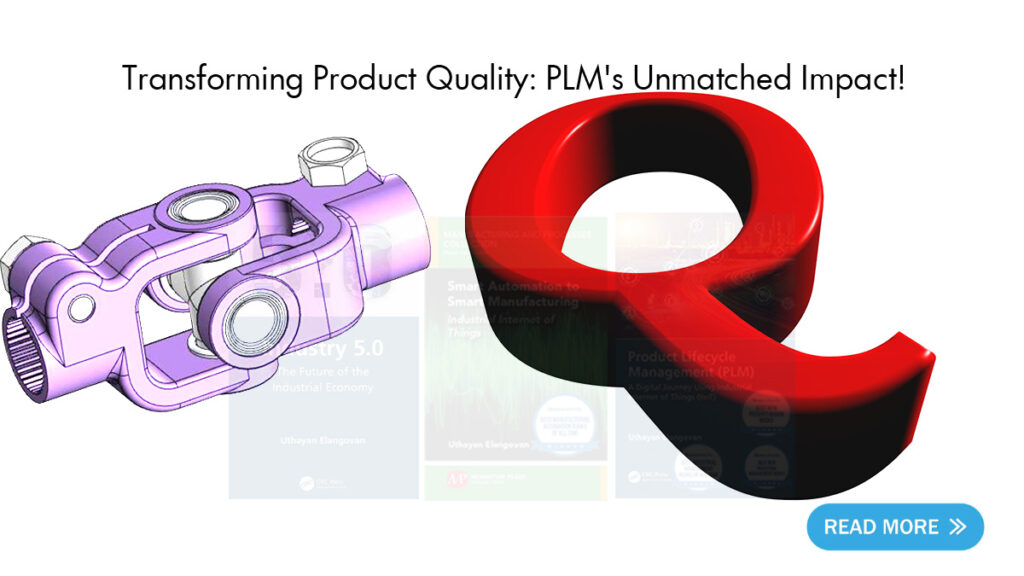Welcome to a journey of manufacturing excellence, where Product Lifecycle Management (PLM) stands as the driving force behind empowering unmatched product quality.

- Introduction:
- Accelerated Design Iterations for Optimal Quality:
- Holistic Product Traceability for Compliance:
- Supplier Collaboration for Ethical Excellence:
- Enhanced Design Validation for Reduced Risks:
- Environmental Management for Sustainable Manufacturing:
- Data-Driven Continuous Improvement for Unwavering Excellence:
- Conclusion:
Introduction:
In today’s fast-paced and ever-changing manufacturing landscape, achieving unparalleled product quality is no longer just a goal; it’s a necessity. Manufacturers must not only meet customer expectations but also adhere to stringent quality standards, including social responsibility, risk management, environmental management, and auditing. Product Lifecycle Management (PLM) emerges as the cornerstone of success in this pursuit, providing a comprehensive framework that aligns with various quality standards while driving continuous improvement. In this blog, we delve deep into how PLM empowers manufacturers to excel in manufacturing quality standards, ensuring products that not only meet but exceed expectations.
Experience unparalleled quality excellence as PLM drives innovation, streamlines processes, and accelerates success in the automotive industry.
Accelerated Design Iterations for Optimal Quality:
Product quality often hinges on multiple design iterations and improvements. PLM provides manufacturers with the tools to streamline and accelerate these iterations. By enabling real-time collaboration, version control, and change management, PLM allows engineering teams to work efficiently, resolving issues promptly and fine-tuning designs quickly. This iterative approach leads to higher-quality products, as design flaws are caught and rectified early in the process.
Holistic Product Traceability for Compliance:
PLM systems maintain a comprehensive record of every stage of the product development lifecycle. From initial design concepts to final specifications, manufacturers can trace every change, decision, and approval. This holistic product traceability ensures that all quality-related activities, such as testing, compliance checks, and validation, can be verified and audited accurately. As a result, manufacturers gain better control over quality assurance processes and can easily identify and address any potential issues that may arise during audits and compliance checks.

Check out Windchill 13x
Supplier Collaboration for Ethical Excellence:
Ensuring product quality often depends on the reliability and consistency of suppliers. PLM facilitates better collaboration with suppliers, allowing manufacturers to share design specifications, quality requirements, and performance expectations. This transparency helps suppliers align their processes with the manufacturer’s quality standards, fostering a mutually beneficial partnership focused on delivering high-quality components and materials. By promoting ethical excellence throughout the supply chain, PLM enables manufacturers to uphold social responsibility principles.
Enhanced Design Validation for Reduced Risks:
PLM tools enable virtual prototyping and simulation, empowering manufacturers to validate designs before physical prototypes are created. Through detailed analysis and testing, potential flaws and weaknesses can be identified early on. This capability not only saves time and resources but also minimizes the risk of costly design errors. As a result, manufacturers can fine-tune their designs to perfection, ensuring superior product quality from the outset and mitigating potential risks associated with subpar designs.
Environmental Management for Sustainable Manufacturing:
As sustainability becomes an integral part of manufacturing, PLM supports manufacturers in adopting eco-friendly practices. PLM systems facilitate environmentally conscious decision-making by providing data on the environmental impact of materials, manufacturing processes, and supply chain operations. With this information, manufacturers can make informed choices to optimize resource usage and reduce their carbon footprint, promoting sustainable product development that aligns with environmental management standards.
Data-Driven Continuous Improvement for Unwavering Excellence:
PLM serves as a hub for valuable data gathered throughout the product lifecycle. Manufacturers can leverage this data to drive continuous improvement initiatives. Through data analysis, trend identification, and customer feedback integration, PLM empowers manufacturers to make informed decisions, proactively address quality issues, and refine products for better performance and customer satisfaction. This unwavering commitment to continuous improvement is essential for exceeding quality standards and surpassing customer expectations.
Conclusion:
In the realm of modern manufacturing, the pursuit of unparalleled product quality goes beyond meeting customer demands. Manufacturers must uphold a range of quality standards, including social responsibility, risk management, environmental management, and auditing. Embracing Product Lifecycle Management (PLM) offers a holistic approach that aligns with these standards while driving continuous improvement. Through PLM’s integration of social responsibility practices, comprehensive risk management, sustainability initiatives, streamlined auditing processes, and data-driven continuous improvement, manufacturers can achieve excellence in product quality and stand out in the competitive market. PLM becomes the catalyst for a manufacturing journey that not only fulfills quality standards but also exceeds customer expectations, building lasting trust and loyalty in the hearts of consumers. By harnessing the power of PLM, manufacturers pave the way for unparalleled product success and drive their businesses towards a prosperous and sustainable future.

